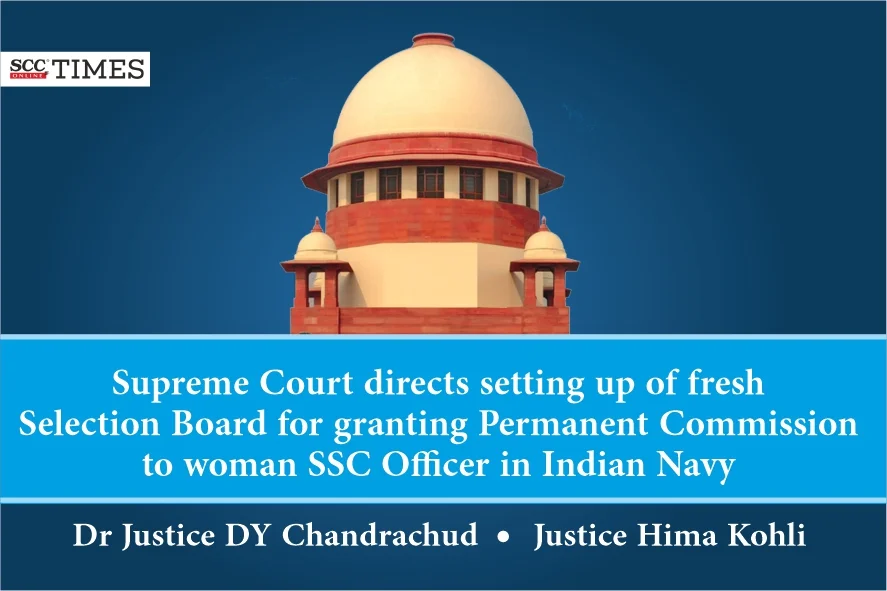Supreme Court: In a review petition pertaining to the grant of Permanent Commission to Short Service Commission Officers in the Indian Navy, the division bench of Dr Dhananjaya Y Chandrachud*, CJI. and Hima Kohli, J. has directed that the petitioner should be considered for the grant of Permanent Commission afresh by reconvening a Selection Board. Further, the Selection Board was directed to consider the case of the petitioner on stand-alone basis since it is common ground that she was the only serving JAG Branch officer of the 2007 batch whose case for the grant of Permanent Commission was required to be considered. It also added that the exercise of considering the petitioner afresh for Permanent Commission should be carried out on or before 15-04-2024.
The petitioner was commissioned in the Indian Navy as a Short Service Commissioned Officer in the Judge Advocate Generals’ Branch of the Indian Navy on 6-08-2007. She was promoted on 6-08-2009 as a Lieutenant and, thereafter, on 6 -08-2012 as a Lieutenant Commander. During the course of her service, she was granted an extension in November 2016 for a period of two years and, thereafter, for an equivalent duration in August 2018. On 5-08-2020, the petitioner was informed that she would stand released from service on 5-08-2021.
The petitioner was an officer who was recruited before the Policy Letter (‘PL’) of 26-09-2008 was issued. The PL stipulated that while women SSCOs would be considered for grant of Permanent Commission in stipulated branches (JAG, Education and Naval Architecture), the letter would have prospective effect. It was because of the application of the PL that the petitioner was initially not considered to be eligible for the grant of Permanent Commission.
The Court took note of Union of India v. Annie Nagaraja, (2020) 13 SCC 1, wherein it was held that the policy decision of the Union Government dated 25-02-1999 would govern the conditions of service of SSCOs including women officers regarding the grant of Permanent Commission s in terms of Regulation 203 Chapter IX Part III of the Naval Ceremonial, Conditions of Service and Miscellaneous Regulations, 1963(‘Naval Regulations 1963’). Further, the PL of 26-09-2008 was quashed and set aside. The Court had also directed that all SSCOs in the Education, Law and Logistic Cadres who were “presently in service”, should be considered for the grant of Permanent Commission. This entitlement arose from the PL dated 25-02-1999 read with Regulation 203 of Chapter IX of the Naval Regulations 1963.
The Court noted that petitioner had earlier moved this Court under Article 32 of the Constitution but was relegated to the Armed Forces Tribunal. The directions of AFT formed the subject matter of challenge before this Court in a civil appeal. This appeal was disposed of by this Court by its order dated 20 -10-2022.
The Court viewed that the ends of justice would require that the order dated 20-10-2022 pertaining to the petitioner, should be recalled. Further, it noted that the petitioner was considered for the grant of PC after the judgment1 of this Court but has been denied Permanent Commission on the ground that there were no vacancies.
Considering the peculiar facts and circumstances of this case, the Court directed that the petitioner should be considered for the grant of Permanent Commission afresh by reconvening a Selection Board. Further, the Selection Board was directed to consider the case of the petitioner on stand-alone basis since it is common ground that she was the only serving JAG Branch officer of the 2007 batch whose case for the grant of PC was required to be considered. The Court added that the consideration by the Selection Board should take place uninfluenced by any previous consideration of her case for Permanent Commission and uninfluenced by any observations contained in the order of the AFT.
Under Article 142 of the Constitution to ensure that while no other officer is displaced, a long-standing injustice to the petitioner is duly rectified, the Court directed that if pursuant to the directions of the AFT, if a proportional increase in the vacancies is required to be created to accommodate the petitioner, then this should be carried out without creating any precedent for the future.
[Cdr Seema Chaudhary v. Union of India, 2024 SCC OnLine SC 197, decided on 26-02-2024]
*Judgment Authored by: Chief Justice of India Dr. DY Chandrachud
Buy Constitution of India HERE
1. Union of India v. Lieutenant Commander Annie Nagaraja, (2020) 13 SCC 1








